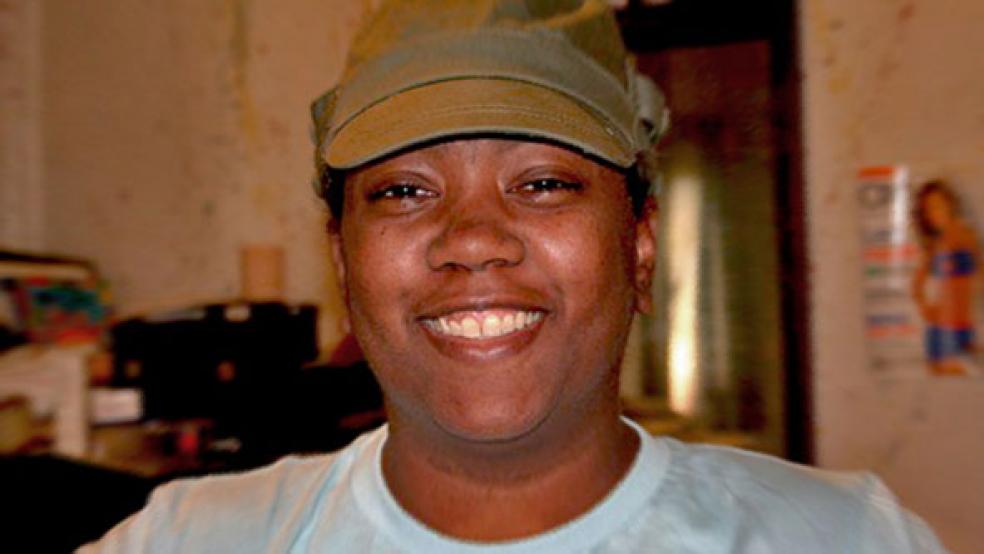In the summer of 2008, Angela Thurmond was 23 and broke. She had recently graduated from the University of Washington with a major in economics and in the midst of the recession was $50,000 in debt. Her dream was to work in book publishing, and since job prospects in Seattle were minimal, she packed her bags to live in the hub of the publishing industry: New York City.
Unable to afford NYC’s high rents, she settled in a downtrodden section of Brooklyn, complete with a heroin-dealer landlord, and set out to look for jobs. She sent her resume to every publishing house in the phone book while holding a part-time job at a coffee shop. But there were no offers, so she applied for unpaid internships at literary agencies in the hopes of future employment.
By November, her savings were running critically low. One day, sitting on the porch with one of her neighbors, he suggested she apply for food stamps. She laughed it off, but after more neighbors told her the same thing, she thought, why not? She and her roommate decided to see if they would be eligible. Too broke to afford the train ride, they rode their bikes in the pouring rain to the NYC Department of Social Services office and waited for three hours in sopping wet clothes. They handed over birth certificates, pay stubs and their rental lease, and were told that, if approved, their cards would be arriving in the mail. A few weeks later, down to the last $10 in her bank account and worrying how she was going to make it through the month, she spent her remaining change on sweet potatoes and green beans for a meager Thanksgiving dinner. But when she got home, sitting on the table was her Electronic Benefit Transfer (EBT) card.
"I was so happy," she said. "I went back to Key Foods with it and bought those crispy onions for the green bean casserole and apples to make pie. We had a ballin’ Thanksgiving that year."
Don’t Call Us….
Ms. Thurmond is one of thousands of young Americans struggling to find their footing in the recession. They’re collecting unemployment, signing up for food stamps, moving back home, and growing increasingly concerned about the future. A New York Times/CBS poll showed that 46 percent of Americans think the younger generations will be worse off than their parents, up from 32 percent last year. The Millennials — people born around 1980 and coming of age at the turn of the century — are the largest generation in the history of the country, about 80 million strong. In The Trophy Kids Grow Up: How the Millennial Generation Is Shaking Up the Workplace, Ron Alsop wrote, "If there is one overriding perception of the Millennial generation, it's that these young people have great -- and sometimes outlandish -- expectations." Described as confident, tech-savvy and optimistic, they are now seeing the American dream they once felt entitled to slipping through their fingers.
"They’ve been set up by going to college and thinking if you work hard at something you enjoy doing, you’ll be rewarded," says Nan Mooney, author of Not Keeping Up with Our Parents. "But it’s not true anymore."
In a Salon article last week titled "Hipsters on Food Stamps," Jennifer Bleyer wrote about the growing numbers of educated Americans in their 20s and 30s signing up for the Supplemental Nutrition Assistance Program (SNAP). Although the article raised concerns about the trend, it also focused on the type of food they were buying, detailing one food stamp recipient’s meal of "roasted rabbit with butter, tarragon and sweet potatoes," which drew hundreds of heated comments about privilege, class and welfare. "The culture of parasitic handout dependence is spreading to the educated middle class," wrote one particularly spiteful commenter.
Class distinctions notwithstanding, the fact remains that the unemployment rate among young Americans is at a historic high. In September, 53.4 percent of adults ages 16 to 24 were without work. In NYC alone, the number of food stamp recipients among childless adults between ages 20 to 30 was up 50 percent this year.
Declaration of Dependence
They’re called "boomerang kids" — children who graduate from college but continue to live at home. A Pew poll released last Thursday found that between 2007 and 2008, 2.6 million more Americans began living in multi-generational households, many of them kids upsetting the empty nests of their parents.
Jane Van Susteren, a 28-year-old University of California at Davis graduate, was laid off last year after working on a global warming research project. Her fiancé, a computer programmer, was also having trouble finding work, so they both moved back in with their parents — hers in a small town just south of the Oregon border, his in Oakland, Calif. While she bided her time and applied to the few jobs open in her field, she paid her parents a small amount of rent with her unemployment benefits. "It alternates between living with fairly cool, fairly reasonable roommates, to being really infantilized and feeling like you’re 8 years old. And sometimes both in the same day."
Since leaving the Navy in 2004, 30-year-old Wendy Stewart has been living with her mother in Baltimore. Although she has two degrees: a BA in history from the Naval Academy and one from the University of Baltimore in business administration, she ended up taking a pizza delivery job to get by. Recently her aunt and older sister have also moved back in. Now there are seven people living in a three-bedroom house.
"There is still a rhetoric in this country that if you do work hard, you should be able to do well," says Mooney. "And if you’re not doing well, it’s because you didn’t work hard enough or you weren’t smart enough. So then when you’re still working at Starbucks at 30 years old, you feel like, I screwed up, what do I do? It generates a lot of self-doubt that will stay with you."
Brain Drain
Even for the employed, things have gotten worse. The average salary for 2010 graduates is $48,000, down 2 percent from last year. Adjusted for inflation, new graduates earned $37,000 in 1990, a number that grew 30 percent over the past two decades. In that same span of time, college costs and student debt have more than doubled, and median home prices, even after the bubble burst, have increased 42 percent. "They are up against a set of obstacles that are unique for this generation," says Mooney. "People who could make it on their own and could afford things like health insurance and child care 10 or 20 years ago can’t anymore. There’s no backup."
Blogs like Ivy Leagued and Unemployed and Jobless Lawyer detail story after story showing that even the highest ranked, most expensive education won’t get you a job. The Association for Legal Career Professionals recently found that callback interviews for entry-level summer associates have fallen by 40 percent since 2007, and offer rates dropped 23 percent -- from 89.9 percent in 2008 to 69.3 percent in 2009, the lowest ever measured by the organization. In February, a Gallup poll found that 65 percent of those unemployed with a college or postgraduate degree were not hopeful about finding work (compared to 59 percent of those with high school or less).
When it came time to reapply for food stamps this past November, Angela Thurmond decided against it. In addition to the coffee shop, she found a second job as a nanny. She’s keeping up with the interest on her loans, and feels more comfortable financially. "The last time I went in, they seemed so strained. I thought so many more people need this right now. I’m doing better. It seemed selfish." After applying to over 100 jobs in publishing and not getting a single interview, she’s thinking about moving to Germany to pursue a career in foreign rights publishing. "I want to be an editor, but it’s just not a viable career anymore."


